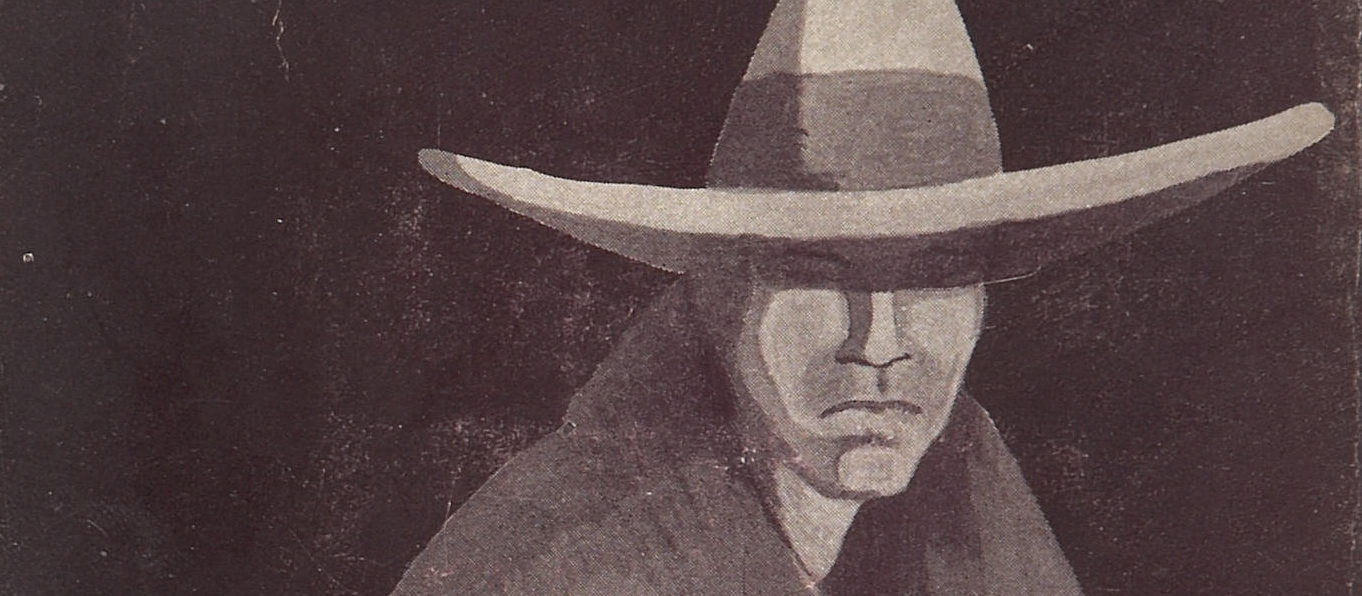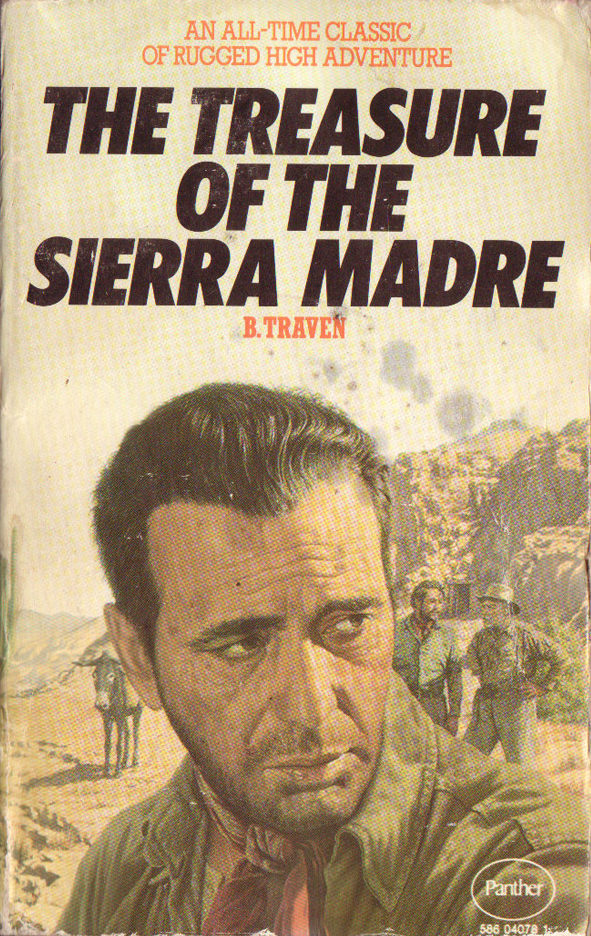

“Any decent woman would have preferred to drown herself or cut her veins rather than keep company with these men.”
The Treasure of the Sierra Madre has a reputation as a rakish adventure owing to the film version starring a grizzled Humphrey Bogart. But the book is a different kind of story entirely, one distinguished as much by its cynical views of capitalism, industrialization, and Catholicism as by its rambunctious tale of greedy gold prospectors and gangs of outlaws. It presents its main story, that of a ragtag trio of hopeful prospectors in the Mexican desert, through the eyes of the destitute characters living through it. Peppered throughout the main narrative are a handful of short stories relayed through the mouths of various characters that function to flesh out the book’s themes and setting. Although it doesn’t have the charm of John Huston’s film, its exploration of the psychology of greed—and how repeatedly succumbing to such avarice can lead to the corruption and destruction of both the individual and society—is worthy enough on its own merit.
The story begins by rounding up our small group of unlucky Americans, who are living in boardinghouses along the Tampico waterfront, temporarily unemployed and scrounging for their sustenance. With the oil boom dwindling, it seems unlikely that Dobbs and Curtin can make it rich in the field, and they’ve resorted to panhandling. In an amusing early chapter, Dobbs seems to hit a lucky streak, finding that men in white suits frequently hand him a few coins, only to discover that it has been the same man in a white suit repeatedly giving him funds. After a hard stint as roughnecks on a rigging crew finds the two threatening their employer merely to be given their earned pay, they encounter Howard, a voluble old-time prospector who immediately warns them of the corrupting influence of wealth on the minds of men. He relays the legend of an inexhaustible gold mine on the U.S./Mexico border, including the massacres, slave labor, clerical corruption, and descents into madness that came about as a result of pursuing its riches. More intrigued than disturbed, Dobbs and Curtin work out a deal with Howard, and the three set out to find themselves some gold.
Although the trio manages to accumulate a small fortune, just as Howard warned, their mental states begin to shift. Whereas in the opening chapter Dobbs was down on his luck, he now views himself as superior to the disadvantaged working class from which he came. The anxious men grow suspicious of outsiders, camouflaging the mine and camping more than a mile away. The pragmatic Howard knows all the tricks of the trade as well as its pitfalls, and is able to keep himself emotionally removed from the endeavor, but Dobbs and Curtin become increasingly paranoid about protecting their earnings and imagining what they will do with it. The real rub is that they can’t trust one another because they don’t properly trust themselves. The men are not friends with one another, and although they endure hardships together and save each other’s lives on multiple occasions, each is aligned in purpose with the others only as a means to enrich himself.
Still none of them ever believed that such assistance was given, or that sacrifices were made, out of pure kindness. Each of them felt that this service was rendered because, had one of them lost his life, the other two could not have worked the field alone. Just as soldiers, personally unknown to each other but belonging to the same nationality or to that of allied armies, will help their fellow soldiers not alone for patriotic reasons but for many other reasons, which may, often, be very difficult to explain in detail.
Things are shaken up by Lacuad, a determined prospector who shows up one day certain that there is a mother lode somewhere nearby. He works his way into the company of the men, sharing their food and campsite. They keep up their cover as a hunting party for as long as possible, but when a gang of bandits approaches in the distance, they bring the man into their confidence. Lacuad tells the story of the bandits—how they boarded a passenger train and slaughtered men, women, and children indiscriminately in the name of Jesus.
Things come to a head when the prospectors try to leave with their haul. They’d always been leery of anyone knowing of their plans. They had no permits or licenses, and only evaded the bandits by a stroke of luck. But now they must secure the gold on themselves and schlep it to Durango without raising suspicions. Howard gets lured off by natives who think he has magical powers because he understands the basics of first aid, and the other two continue on with promises to stash his money at a bank in Durango. But of course the minds of Dobbs and Curtin are tainted by greed at this point, and both think that the other is bound to betray him and take all the gold for himself. The betrayal inevitability occurs—a cold-blooded bullet in Curtin’s back—and later, Dobbs is accosted by three desperados who lop off his head with a machete. Failing to comprehend the value of the bags of sand hidden within the saddlebags of the burros Dobbs had led, the desperados dump them out so the burros will be less strained on their journey with their new owners. I would have preferred the novel ended there, but Curtin ends up surviving, the property is returned to its owners, and some additional pouches of gold are found that allow Curtin and Howard to still make out all right.
While I enjoyed the book for its punchy prose style and story-within-a-story narration method, I wasn’t particularly moved by it. The narration style is sometimes hilarious—the dialogue is particularly delicious, as the men regularly throw insults at one another and use the phrase “funking” instead of its obvious substitute—but sometimes dry when it drops into a mode of simply reciting what has taken place. To be fair, finding gold is probably exciting, but digging for it in the scorched desert sounds like hell. Putting us in the trenches with those being exploited by ruthless oil tycoons gives the story a sheen of authenticity, as do the passionate descriptions of the Mexican people, villages, and landscape. Present throughout the novel is a cynical worldview that looks negatively at capitalism and Catholicism, most evident in Howard’s choice to live out his days among the indiginous people and the fact that nearly every villain spouts the name of Jesus Christ as they carry out their misdeeds. I don’t think the criticisms are necessarily distasteful, but they seem a bit too blunt for my sensibilities; i.e. these elements are used to ridicule rather than criticize.
Perhaps more interesting than the book itself is its author, the pseudonymous B. Traven, whose true identity remains unknown to this day. Reviews of Sierra Madre invariably spend more time talking about the author than about the contents of the novel, though, so I’ll let you spend a few minutes perusing that subject on your own time. Suffice to say that many seem to find his impenetrable history almost as interesting as his published work.
I don’t think The Treasure of the Sierra Madre quite lives up to its reputation, or to the film version, but it is still enjoyable to read and took me to a setting and era that I haven’t had much exposure to before. Although it is very focused on the inner state of its characters—a very literary method of storytelling—it has the flavor of the great irreverent Westerns of the New Hollywood era that I greatly enjoy. Death and depravity are not merely implied; Traven is blatant with his language and shock value. A character getting nonchalantly decapitated by a machete (a violent image only implied in the movie version) is something you expect to see in a Sam Peckinpah film. But this book came out in 1927.